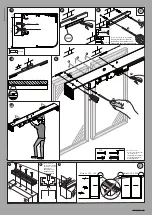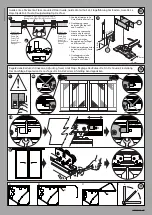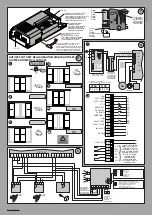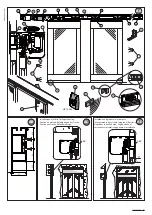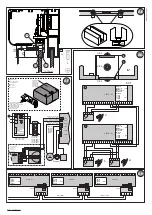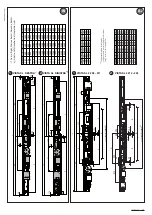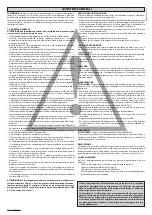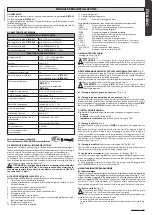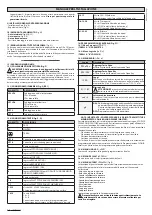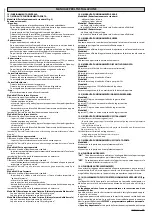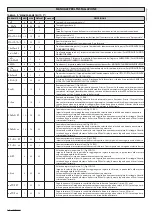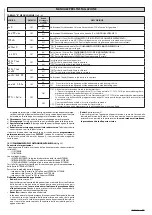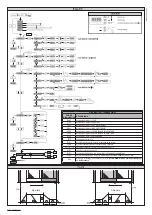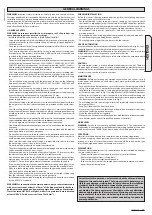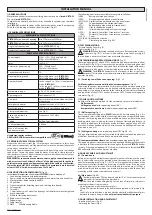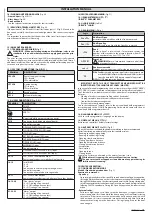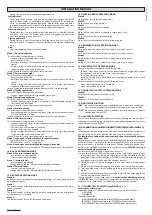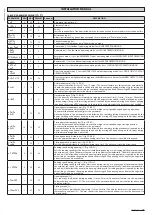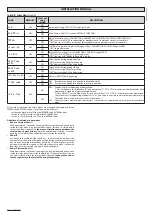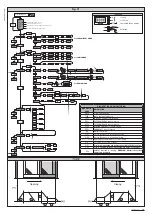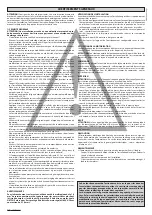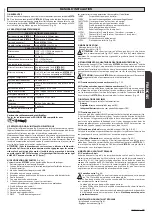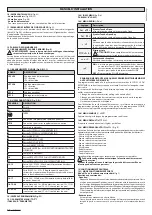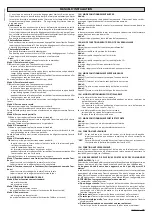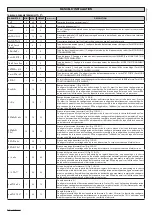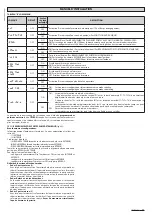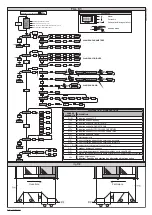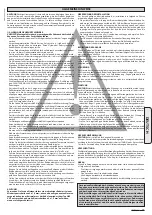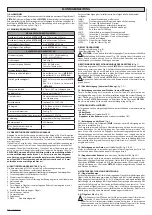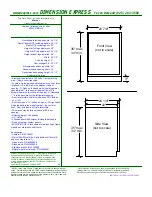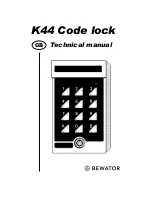
GENERAL WARNINGS
WARNING!
Important safety instructions. Carefully read and comply with the
Warnings booklet and Instruction booklet that come with the product as incorrect
installation can cause injury to people and animals and damage to property. They
contain important information regarding safety, installation, use and maintenance.
Keep hold of instructions so that you can attach them to the technical file and
keep them handy for future reference.
1) GENERAL SAFETY
WARNING! An incorrect installation or improper use of the product can
cause damage to persons, animals or things.
•
Installation must be carried out by a “professional installer”.
• Scrap packing materials (plastic, cardboard, polystyrene etc) according to the
provisions set out by current standards. Keep nylon or polystyrene bags out of
children’s reach.
• This product was exclusively designed and manufactured for the use specified
in the present documentation.
• The Company declines all responsibility for any consequences resulting from
improper use of the product, or use which is different from that expected and
specified in the present documentation.
• Do not install the product in explosive atmosphere.
• The units making up the machine and its installation must meet the requirements
of the following European Directives: 2004/108/EEC, 2006/95/EEC, 98/37/EEC,
99/05/EEC (and later amendments). For all countries outside the EEC, it is advis
-
able to comply with the above-mentioned standards, in addition to any national
standards in force, to achieve a good level of safety.
• The Company declines all responsibility for any consequences resulting from
failure to observe Good Technical Practice when constructing closing structures
(door, gates etc.), as well as from any deformation which might occur during
use.
• The installation must comply with the provisions set out by the following
European Directives: 2004/108/EEC, 2006/95/EEC, 98/37/EEC, 99/05/EEC and
subsequent amendments.
• Disconnect the electrical power supply before carrying out any work on the
installation. Also disconnect any buffer batteries, if fitted.
• Fit an omnipolar or magnetothermal switch on the mains power supply, having
a contact opening distance equal to or greater than 3,5 mm.
• Check that a differential switch with a 0.03A threshold is fitted just before the
power supply mains.
• Check that earthing is carried out correctly: connect all metal parts for closure
(doors, gates etc.) and all system components provided with an earth termi
-
nal.
• Fit all the safety devices (photocells, electric edges etc.) which are needed to
protect the area from any danger caused by squashing, conveying and shearing,
according to and in compliance with the applicable directives and technical
standards.
• The Company declines all responsibility with respect to the automation safety and
correct operation when other manufacturer’s components are used.
• Only use original parts for any maintenance or repair operation.
• Do not modify the automation components, unless explicitly authorised by the
Company.
• Instruct the product user about the control systems provided and the manual
opening operation in case of emergency.
• Do not allow persons or children to remain in the automation operation area.
• Keep radio control or other control devices out of children’s reach, in order to
avoid unintentional automation activation.
• Make sure the stated temperature range is compatible with the site in which
the automated system is due to be installed.
• Do not install the product in an explosive atmosphere.
• The motor cannot be installed on panels incorporating doors (unless the motor
can be activated when the door is open).
• If the automated device is installed at a height of less than 2.5 m or is accessible,
the electrical and mechanical parts must be suitably protected.
• Any fixed controls must be installed within sight of the door but away from
moving parts. Unless the control is key operated, it must be installed at a height
of at least 1.5 m and in a place where it cannot be reached by the public
• If there are no instructions already, attach a label near the operating device, in a
permanent fashion, with information on how to operate the manual release.
• Make sure that nothing can be crushed between the guided part and surroun
-
ding fixed parts during the door’s operation
• Once installation is complete, make sure the motor has the right settings and
that the safety and release systems are working properly.
• Installation must be carried out using the safety devices and controls prescribed
by the EN 12978 Standard.
WARNING! For connection to the mains power supply, use a multicore cable
with a cross-section of at least 3x1.5mm
2
of the kind provided for by the re-
gulations mentioned above (by way of example, if the cable is not protected,
it must be rated H07 RN-F or higher, while if it is protected it must be rated
at least H05 VV-F with a cross-section of 3x1.5mm
2
).
CHECKING INSTALLATION
Before the system is finally put into operation, perform the following operations
meticulously and with the utmost care:
• Put the automated system through its paces, running a few cycles to check
that the belt is aligned perfectly. If the belt tends to slip off the pulleys, perform
alignment by loosening the motor brackets and/or driven pulley brackets, tilting
them suitably to correct the error. Once done, tighten the relevant screws.
• Check that all safety devices (photocells - anti-crush sensor sensitivity) are
working properly.
• Check opening and closing operations commanded by radar and manually.
• Check the emergency opening devices applied.
• Check all operating logics that can be set with the selector.
USE OF AUTOMATION
As automation can be remotely controlled and therefore not within sight, it is es-
sential to frequently check that all safety devices are perfectly efficient.
WARNING!
In case of any malfunction in the safety devices, take imme-diate
action and require the assistance of a specialised technician.
It is recommended to keep children at a safe distance from the automation field
of action.
CONTROL
The automation system is used to obtain motorised access control. There are
different types of control (manual, remote, magnetic badge, mass detector etc.)
depending on the installation requirements and characteristics. For the various
control systems, see the relevant instructions.
MAINTENANCE
WARNING: Before performing any maintenance work on the system, cut off
mains power and disconnect the battery. Have work performed by qualified
personnel only.
• For quick checks and maintenance, secure the cover as illustrated in position B
in Fig. O, turning bracket S outwards. For maintenance requiring full access, on
the other hand, we recommend - ceiling height permitting - securing the cover
as illustrated in position C in Fig. O, turning bracket S so that the outermost part
of the cover rests against it. If this is not possible, we recommend removing the
cover. Once work is complete, close the automated system up again, attaching
the front cover as illustrated in position A in Fig. O.
• Check sliding parts for wear at regular intervals (especially runner wheels and
door guide slides).
• Keep the slideway of the floor track clean.
• Make sure, at regular intervals, that the door stops when it encounters obstacles
that are not detected by the photocells.
• Clean the photocells’ optics regularly.
• Whenever you encounter a malfunction of any kind that has not been remedied,
cut off mains power and call in qualified personnel (installer).
NOISE LEVEL
WARNING: Employ the services of qualified personnel only. The airborne noise
produced by the automated system under normal working conditions is constant
and does not exceed 70dB(A). If the door is noisy, check sliding parts for wear.
SCRAPPING
Materials must be disposed of in conformity with the current regulations.
In case of scrapping, the automation devices do not entail any particular risks
or danger. In case of recovered materials, these should be sorted out by type
(electrical components, copper, aluminium, plastic etc.).
DISMANTLING
When the automation system is disassembled to be reassembled on another
site, proceed as follows:
- Disconnect the power supply and the entire electrical installation.
- Remove the actuator from its fixing base.
- Disassemble all the installation components.
- In the case where some of the components cannot be removed or are dam-
aged, they must be replaced.
ENGLISH
Correct controller operation is only ensured when the data contained in
the present manual are observed. The Company is not to be held respon-
sible for any damage resulting from failure to observe the installation
standards
and the instructions contained in the present manual.
The descriptions and illustrations contained in the present manual are
not binding. The Company reserves the right to make any alterations
deemed appropriate for the technical, manufacturing and commercial
improvement of the product, while leaving the essential product fea-
tures unchanged, at any time and without undertaking to update the
present publication.
D811590 00100_01
VISTA SL
- 19

